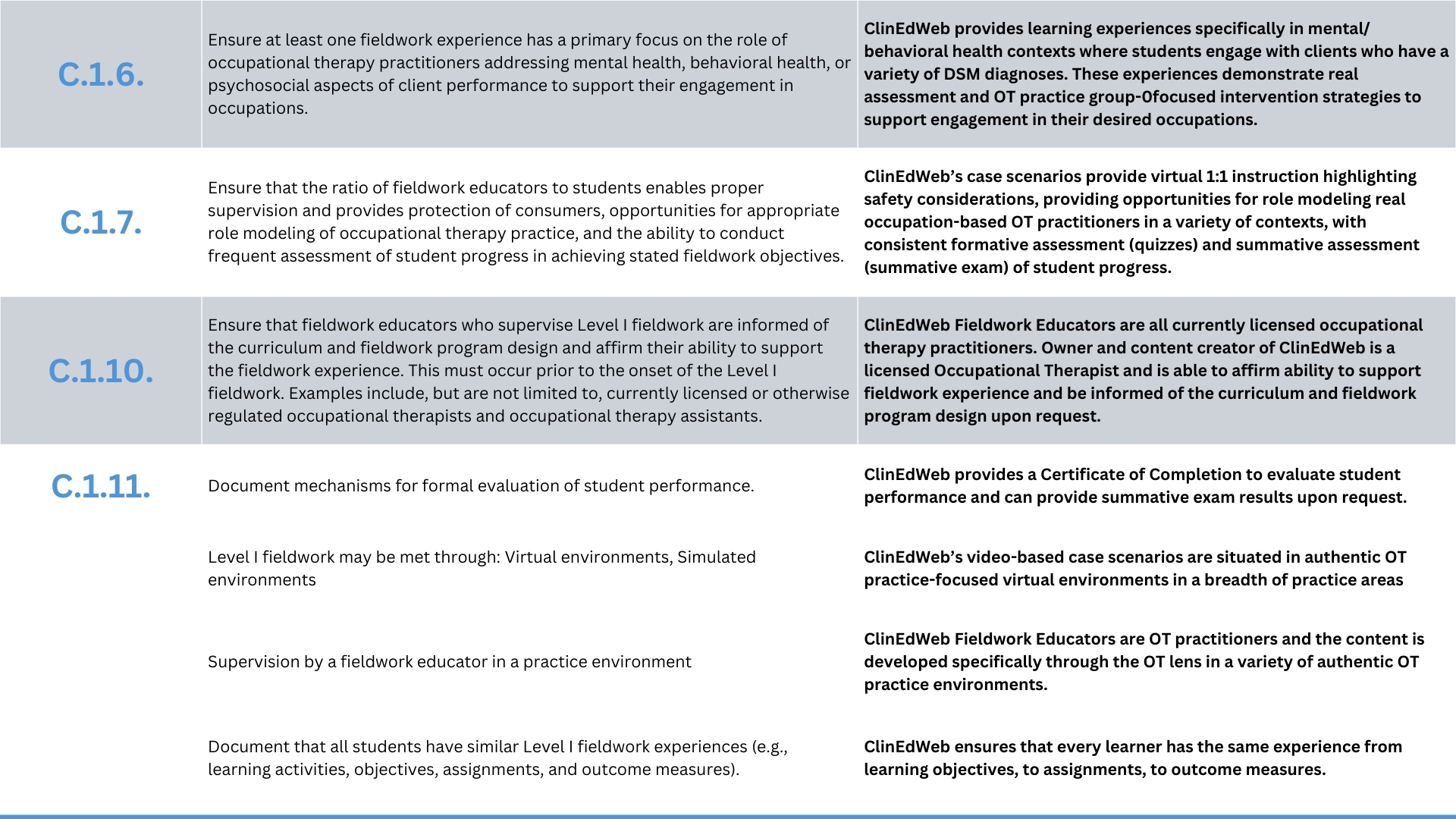Vera and Simone
Diagnoses: Bipolar I Disorder, Major Depressive Disorder
In this interactive case scenario you assume the role of fieldwork student in an outpatient behavioral health setting assisting with evaluation and group intervention with an individual with Bipolar I Disorder and treatment of a client with Major Depressive Disorder.
B.2.7. Activity Analysis - See Group Intervention Plan
B.3.2. Professional Reasoning - See Group Intervention Plan
B.3.3. Standardized and Nonstandardized Screening and Assessment Tools - See ACLS Assessment Tool Questions and Medication Box Task Assessment Quiz
B.3.4. Application of Assessment Tools and Interpretation of Results - See Initial Evaluation and ACLS Scoring Form
B.3.5. Reporting Data - See Initial Evaluation, ACLS Scoring Form, and Group Intervention Plan
B.3.6. Provide Interventions and Procedures - See Group Intervention Plan
B.4.3. Documentation of Services - See Initial Evaluation and Progress Note Forms
(See C Standards in chart below)


By the end of this case scenario, learners will be able to:
❏ Glean salient information from a chart review
❏ Identify safety elements related to behavioral/mental health treatment (i.e. sharps, proxemics, confidentiality, de-escalation)
❏ Identify terminology and common symptomology pertaining to Bipolar Disorder and Major Depression
❏ Recognize role of occupational therapy in behavioral health setting
❏ Demonstrate understanding of occupational therapy role with psychotropic medication management
❏ Identify commonly used evaluation tools appropriate for assessing baseline performance skill level in behavioral health setting
❏ Demonstrate understanding of documentation commonly used in behavioral health settings (i.e. Behavioral Observation forms, Evaluation and Progress SOAP notes)
❏ Recognize how to prepare for a group treatment
❏ Recognize demonstration of therapeutic use of self
❏ Hone observation skills
❏ Recognize how OT practitioners connect clients’ participation and performance in task group to cognitive levels and other symptomology such as psychosis.
❏ Develop appropriate written group treatment plan
❏ Identify individual-centered goals from a non-standardized interview
❏ Demonstrate understanding of the evaluative process and scoring of the ACLS
❏ Demonstrate understanding of the connection between ACLS level and function
❏ Demonstrate understanding of the evaluative process and documentation of an open-ended interview
❏ Demonstrate understanding of the evaluative process and documentation of the Medication Box Task Assessment
❏ Interpret evaluation data to inform occupation-based treatment planning
❏ Recommend treatment interventions that include occupations and activities, methods and tasks, education, and training grounded in occupational science
❏ Recognize and demonstrate use of evidence-informed treatment (Group Treatment Plan)
❏ Identify and recommend direct interventions to support safety, function, and access in home and community environments
❏ Recognize the OT practitioner's role in addressing the psychosocial aspects of the client's engagement in occupation.
Case Trailer
FREE PREVIEWClinEdWeb Instructions (Pre-Brief)
FREE PREVIEWC.1.3. Objectives
FREE PREVIEWC.1.6. Meet Fieldwork Educator (Pre-Brief)
Chart - History of Present Illness (HPI)
Chart - Requisitions
Chart - Precautions
Chart - Social History
Chart - Work History
Chart - Past Medical History
FREE PREVIEWChart Review Questions Preparation
Chart Review Questions
Evaluation Preparation
Assessment Tools Question
B.3.3. B.3.4. B.3.5. B.4.3. Download Evaluation Forms
Student Permission
Interview Preparation
FREE PREVIEWInterview
Interview Questions Preparation
FREE PREVIEWInterview Questions
Initial Interview and Evaluation Documentation
Actual OTR Note
ACLS Preparation
FREE PREVIEWACLS Assessment Tool
B.3.3. B.3.4. ACLS Assessment Tool Questions
Actual OTR Note
Medication Box Task Assessment Preparation
FREE PREVIEWMedication Box Task Assessment
B.3.3. B.3.4. Medication Box Task Assessment Quiz
Actual OTR Note
Life Skills Group Preparation
FREE PREVIEWOutpatient OT Interview Evaluation Note
Safety Considerations
FREE PREVIEWLife Skills Group Supplies
Group Behavioral Observation Form
Life Skills Group Intro
FREE PREVIEWLife Skills Group Intro Question
FREE PREVIEWLife Skills Group Icebreaker
Life Skills Group Icebreaker Question
Life Skills Group Main Activity
Life Skills Group Main Activity Questions
Life Skills Group Discussion
Life Skills Group Discussion Questions
B.3.18. B.4.3. Documentation
B.2.7.B.3.2.B.3.5.B.3.6.Intervention Planning
ACLS Debrief Clinical Pearl
ACLS Debrief
Completion Checklist
FREE PREVIEWSummative Exam Preparation
FREE PREVIEWSummative Exam
ClinEdWeb Vera and Simone Case Scenario: Simulation Effectiveness Tool -‐ Modified *Leighton, K., Ravert, P., Mudra, V., & Macintosh, C. (2015)

"It was helpful to see the process in action beginning to end. Sarah is really good at her job. Its so much more than just mechanically doing the assessment. It really stresses that human psychological component being a 'therapist'."--OTA Student
"It was very helpful! Being able to observe Vera and Simone throughout this case study was wonderful. Each of the quizzes was helpful and helped me to gauge which information was most important. I learned a lot from this course. It was a great introduction to fieldwork level I as I could pace myself and rewatch videos to make sure I was not missing anything. I would recommend this course to any OT student!"--OTD Student
This website and its content is copyright of Clinical Educators Worldwide, LLC 2026 All rights reserved
Any redistribution or reproduction of part or all of the contents in any form is prohibited other than printing or downloading resources provided, i.e. initial evaluation forms for your personal and non-commercial use only.
You may not, without our express written permission, distribute or commercially exploit the content. Nor may you transmit it or store it in any other website or other electronic retrieval system.
Links and photos provided within the course materials are for informational purposes only. No endorsement of processes or products is intended or implied.